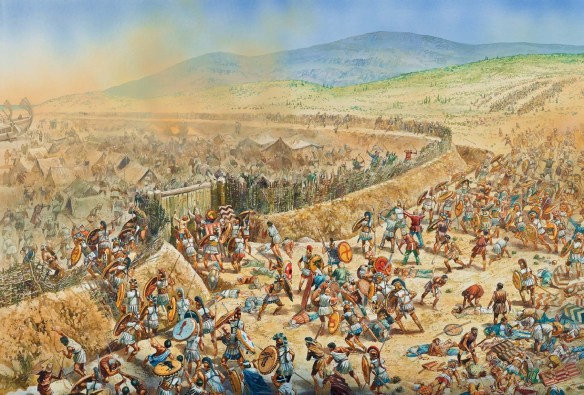At the same time as the battle of Plataea-ancient tradition assigns it to the same exact day-King Leotychidas won the battle of Mycale. The Greek fleet was in the Aegean under the command of the Spartan king. While it was stationed at Delos, three representatives came in secret from Samos and informed the king that the people of Samos were ready to revolt from the Persians and that other Ionians would follow them, if he brought his fleet into action there. He listened to their proposal and he was uncertain whether they were telling him the truth and whether the proposed action was feasible, but when he asked the name of the chief informant and learned that his name was “Lead the Army” (Hegesistratos), the king said,
“I need no further information. I accept this portent.”
The Greek seer, Deiphonus (“Voice of Zeus”) and the Spartan king conducted the religious rites and the sacrifices. The seer announced that the sacrifices were propitious and the king ordered the fleet to sail for Samos.
The Persians withdrew from Samos without a fight and retreated to Mycale on the south coast of Asia Minor where there was a large force of Persian troops. The Persian leaders intended to beach their fleet and use their troops to build fortifications around it and protect it. They had begun the fortifications, quarrying local stone and cutting down fruit trees, when the Greek fleet arrived.
When Leotychidas arrived at Mycale and found that the Persians had beached their ships and that the fleet was protected with a palisade, he had to convince the Greek commanders, who were disappointed that the Persians were not prepared to come out and fight in the open sea, to engage the Persians on land. Leotychidas ordered his ship to be brought as close to shore as it could be, and he shouted out a message for the Ionian Greeks serving in the Persian fleet.
“Men of Ionia, those of you who can hear me, listen to what I say. The Persians will not be able to understand what I say to you. When we fight, first, remember what you have to do to win your freedom and, second, remember our word of recognition, Hera. Those of you who have heard this, pass it on to those who haven’t.”
The message directed at the Ionians aroused the Persians’ suspicions. They were afraid that the Ionians would turn against them, so they disarmed some of them and sent others on missions which carried them away from the battle.
The Greeks forced a landing and drew up their phalanx on the beach opposite the Persians, who had formed behind a line of overlapping shields. The Greeks advanced slowly and hesitantly, until they found the staff of a herald lying on the beach, and a rumor spread (as though brought by a herald) that the Greeks at Plataea had won a great victory. The morale of the Greeks shot up and they charged the Persian position.
The Greek plan was to divide their forces: the Athenians were to move directly at the fortifications and the Persians, while the Spartans were to cross a stream and a barrier of hills and then come down on the fortifications from the rear. The Athenians and their allies first fought the Persians in the open behind their line of shields. The Athenians forced them back into the fortifications and for a time were held there until their commanders called upon them for one more supreme effort. Then the Athenians broke through the wall. The Ionians still on the Persian side turned against them and the other allies fled. Now the Spartans came down from the rear and the last Persian resistance was broken. A few escaped by fleeing into the hills, but many were picked off there. The Persian fleet was destroyed.
The Greeks returned to Samos and there the commanders debated what they should do about the Ionians. By now they had confirmed that the Persians in Greece had been defeated and annihilated, but the Persians still had a presence at the Hellespont and still had enormous resources to bring to bear upon Ionia. The Spartan suggestion was to allow the Ionians who wished to be free of the Persians to move to mainland Greece and settle in the towns of the medizers-“If they love Persia so much, let them move there!” The Athenians objected and suggested rather that they bring the Ionians, beginning with the islanders, into their alliance. The Spartans acquiesced and the islands of Samos, Chios, and Lesbos, and, later, other islanders, joined the alliance. The islanders were required to swear an oath that they would adhere to the alliance and that they would fight for the freedom of all the members of the alliance.
The second Ionian revolt had begun. The League navy set out to the Hellespont to drive the Persians completely out of Europe. They laid siege to Sestos and took it.
